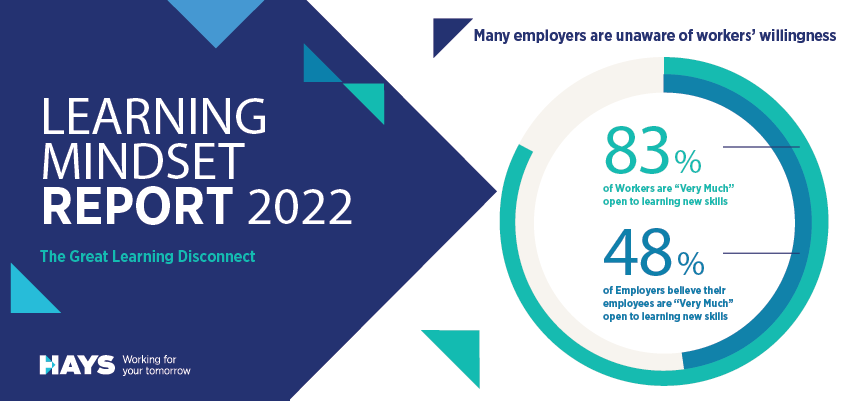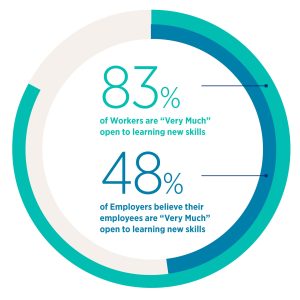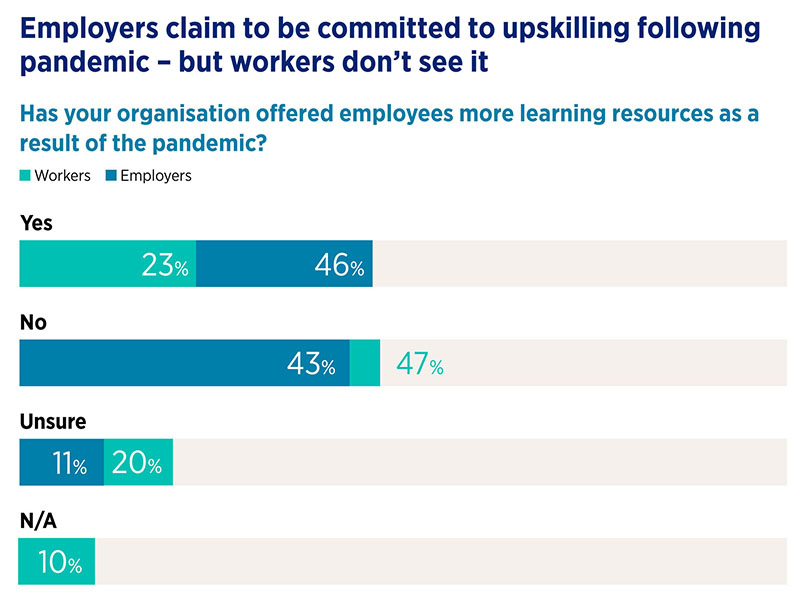The Win-Win For Employers And Employees In Upskilling

The importance of employee upskilling has been heightened since the pandemic. The world of work has changed faster and in more fundamental ways than any of us have experienced before. However, the speed at which digital transformation has taken place has not been matched by the supply of talent available for these roles.
This is a problem affecting business leaders in all sectors and industries. As automation takes over the delivery of repetitive tasks, rather than always seeking new talent, employers ideally want their existing workforce to upskill their capabilities to ensure they can contribute to more specialised roles. In addition, employees are just as keen to make sure their careers continue to grow by actively seeking ways to develop their own skills. Getting this right means that employers get to retain their existing talent, and employees engagement and satisfaction with their employers is increased.
Meanwhile, sustainability continues to be a priority for all of us. At Hays, we have found that growing awareness in the finance sector is driving a significant increase in the number of roles focusing on ESG, while the need for skills around data management is increasingly important in the Green Economy. If candidates with the relevant knowledge are in short supply, upskilling the current workforce is an obvious and important solution.
With all of this in mind, Hays and Go1, an e-Learning supplier who provides us with our free-to-use platform, My Learning, conducted a global survey to understand the learning mindset of both employers and employees. We asked both groups questions about their Attitude, Aptitude and Availability to learning new skills, to see if they were on the same page or if there was a disconnect on this all-important issue.
In this update, I want to highlight the results that formed our Learning Mindset Report 2022 and give you advice on how you can support employee upskilling.
A disconnect in upskilling between employers and employees
Despite the benefits of upskilling the current workforce, our study found that there was indeed a disconnect between the views of workers and their employers. Here are three areas of the report that really stood out to me.
1. Our study found that employers were not always aware of their employees’ willingness to upskill. We found that 83% of workers said they were “very much” open to learning and upskilling, whilst only 48% of employers answered the same for their workforce. Are employers underestimating their employees, or are workers failing to communicate their wishes effectively?

“83% of workers said they were “very much” open to learning and upskilling, whilst only 48% of employers answered the same for their workforce.“
Chris Eigeland, Go1 Co-Founder said: “Our research clearly illustrates that people are eager to learn new skills. They recognise that upskilling, reskilling, and continual growth are the keys to job promotion, greater job satisfaction, and more career options.
“And we know that companies who are not doing enough to nurture their people are experiencing high levels of employee turnover and burnout, while also struggling to attract future talent.”
2. We also found that employers rated their employee training and learning resources far greater than the workers. A little over half of employees confirmed they had adequate access to learning materials from their companies, in comparison to 78% of the employers. In fact, 25% of workers said they were not satisfied with the upskilling offer from their company.
Eigeland continued: “Online learning has utterly transformed the way we upskill, providing people with the training they need to succeed, within a workplace culture of learning. Employers can now adapt their training programs to fit their employees’ needs.
“Instead of a one-size-fits-all approach, HR professionals and L&D managers should look into personalising training so it’s tailored to each employee’s personal needs and goals.”
3. When we asked whether organisations had offered more learning resources because of the pandemic, there was a clear disconnect between the groups, with employers twice as likely as employees to say they had.
Nearly half (46%) of organisations claimed to have offered more learning resources since the pandemic, something only 23% of employees agreed with. Whilst trends such as digital transformation and skills shortages were visible before 2020, there can be no denying the role the pandemic played in accelerating these trends. Upskilling the workforce is a solution, but it would seem employers and employees disagree about the impact of the pandemic on their learning strategies.“

“Nearly half (46%) of organisations claimed to have offered more learning resources since the pandemic, something only 23% of employees agreed with.“
Recommendations to improve employee upskilling
Having identified this disconnect, I want to provide some solutions on what business leaders can do to rectify this.
1. Embed learning into your Employee Value Proposition (EVP). The appetite to upskill is clearly there. At Hays, we knew this through the sheer demand of My Learning, which delivered 29 million minutes of courses over the last 18 months. The Learning Mindset Report has further highlighted this desire to learn.
Business leaders should work with their HR teams to embed learning into their Employee Value Proposition (EVP). Doing so will ensure you benefit from a satisfied workforce with the right skills.
As my colleague Sandra Henke wrote: “According to research conducted by education service provider Lorman, “59% of millennials claim development opportunities are extremely important when deciding whether to apply for a position”, while “76% of millennials believe professional development opportunities are one of the most important aspects of company culture”.
Failing to include learning in your EVP can result in you struggling to retain and attract talent.
2. Build a mentorship scheme. Our report found that mentorship schemes were largely underutilised but when they were, they proved to be popular. Only 21% of employees and 39% of employers said there was a mentorship programme at their organisations; however, 66% of workers and 76% of employers who said they did have a scheme in place were satisfied with it.
On top of this, mentorships were not negatively impacted by the pandemic. In fact, half of employers said the pandemic had a positive impact on the scheme. This compares to just 18% of employees and 20% of organisations who said the pandemic had a negative impact on their mentorship programme.
Mentoring is particularly useful for junior employees, and the benefits are mutual! Shane Little, Managing Director, Enterprise Solutions said: “Setting up mentoring, or more informally, buddy systems within an organisation isn’t a one way stream of information. By encouraging executive levels of the business to create frameworks around intersecting with junior employees, leaders can also gain valuable insights to how the next generation are thinking and feeling about their work.
“In essence, knowledge sharing across all levels serves to benefit junior employees, by empowering them with greater levels of context, executives, by giving them insights into how their next customers are thinking, and businesses as a whole, by ensuring invaluable IP is spread across the entire workforce.”
3. Set learning-based development plans. Our report found that 65% of employers stated they encouraged their workforce to improve their skills regularly during office hours. On top of this, 81% of employers surveyed said they would hire someone with the intention of upskilling them on the job. However, only 27% of employees said they had clear development plans set by their employer that included upskilling.
Creating clear development plans with your employees could help with some of the disconnect we have seen in the Learning Mindset Report. Having open communication to determine your employees’ preferred methods of learning will also ensure you are providing the best possible solutions.
As said by Go1: “It’s vital that HR leaders, as well as their employers, adapt their training methods and solutions to best empower their workforce, making skill development more effective and attainable for their employees.”
The fact that employees are so keen to learn new skills and place such importance on continuous learning is a positive that business leaders must tap into. Digital transformation is not slowing down, whilst skills shortages are still prevalent. If we can get our upskilling strategies right, the benefit will be there for both employers and employees.
You can download the Learning Mindset 2022 report here.
Related Blogs:
AUTHOR
 ALISTAIR COX
ALISTAIR COXChief Executive, Hays
Alistair has been the CEO of Hays, plc since Sept. 2007. An aeronautical engineer by training (University of Salford, UK, 1982), Alistair commenced his career at British Aerospace in the military aircraft division. From 1983-1988, he worked Schlumberger filling a number of field and research roles in the Oil & Gas Industry in both Europe and North America. He completed his MBA (Stanford University, California) in 1991 and returned to the UK as a consultant for McKinsey & Co. His experience at McKinsey & Co covered a number of sectors including energy, consumer goods and manufacturing.
He moved to Blue Circle Industries in 1994 as Group Strategy Director, responsible for all aspects of strategic planning and international investments for the group. During this time, Blue Circle re-focused its business upon heavy building material in a number of new markets and in 1998, Alistair assumed the role of Regional Director responsible for Blue Circle’s operations in Asia, based in Kuala Lumpur in Malaysia. He was responsible for businesses in Malaysia, Singapore, the Philippines, Indonesia and Vietnam. Subsequent to the acquisition of Blue Circle by Lafarge in 2001, he also assumed responsibility for Lafarge’s operations in the region as Regional President for Asia.
In 2002, Alistair returned to the UK as CEO of Xansa, a UK based IT services and back-office processing organisation. During his 5 year tenure at Xansa, he re-focused the organisation to create a UK leading provider of back-office services across both the Public and Private sector and built one of the strongest offshore operations in the sector with over 6,000 people based in India.
Latest articles

Salary Guide
A comprehensive report providing you salary and recruitment trends to guide your talent strategy for the year

Register now
Start your job search by registering your CV and signing up to job alerts.

Career Advice
Our career advice pages cover all stages of the job search process, or contact a Hays consultant for further advice.
